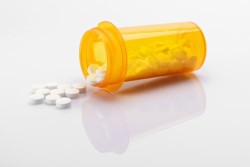Top Class Actions’s website and social media posts use affiliate links. If you make a purchase using such links, we may receive a commission, but it will not result in any additional charges to you. Please review our Affiliate Link Disclosure for more information.

Sometimes Stevens Johnson Syndrome is caused by the body’s reaction to a virus or other illness, but it most often occurs following exposure to pharmaceutical drugs.
A Stevens Johnson Syndrome allergic reaction can occur at any time after ingesting a particular drug. With many more typical allergic reactions, the symptoms present in response to the initial administration of the drug.
This is sometimes the case with SJS, but it can also happen days, weeks, months or longer after exposure to a particular pharmaceutical.
Which Drug Is Most Likely To Cause SJS?
According to a study published in the Journal of the American Academy of Dermatology in 2008, allopurinol is the most common cause of SJS and the much more severe Toxic Epidermal Necrolysis (TEN) throughout Europe and Israel.
In the study, 379 patients who had experienced Stevens Johnson Syndrome or Toxic Epidermal Necrolysis were studied and were matched with 1505 control subjects.
The study found that 66 patients with SJS or TEN were exposed to allopurinol prior to their diagnosis, accounting for 17.4% of the study population. In control subjects, 28 individuals had prior exposure to allopurinol, totaling 1.9%.
Additionally, the study also concluded that greater daily dosages of allopurinol that were equal or greater to 200 mg were associated with a higher risk of developing SJS or TEN.
Using other medications in addition to allopurinol did not increase an individual’s risk, according to the study.
What is Allopurinol?
Allopurinol is a generic drug marked under the brand names Zyloprim and Aloprim and it is used to reduce the body’s production of uric acid. Excess uric acid in the body can lead to the formation of kidney stones or a condition called gout.
SJS and TEN Symptoms To Be Aware of While Taking Allopurinol
Initial symptoms of SJS and TEN look very similar to a cold or flu, complete with a fever, sore throat, headache, chills, stomach upset and malaise. After the flu-like symptoms appear, the skin symptoms begin to appear.
The rash consists of red or purple blisters that start out in the mucous membranes of the body and spread out to various areas of skin. The blistering rash causes skin cells to die and, as a result, the skin begins to flake away from the body, sometimes in large sheets.
Stevens Johnson Syndrome is diagnosed when less than 30% of the body is covered in the characteristic skin rash. If 30% or more of the body is covered with skin lesions, then the diagnosis of Toxic Epidermal Necrolysis is established.
SJS and TEN are considered medical emergencies and hospitalization is required. There is no treatment for SJS or TEN, but the offending medication must be stopped immediately, and interventions will be placed to stabilize patients until the reaction subsides.
The outcome of healing form SJS and TEN varies widely. Some milder reactions may run their course in a few days or less than a week, with little to no lasting effects. Others may be hospitalized for months or over a year with a decreased or total loss of organ function.
The mortality rate for SJS patients is 5-10%, while that of TEN patients is much higher at 25-35%.
It is important to seek immediate medical help if you are experiencing potential symptoms of SJS following the use of allopurinol, Zyloprim or Aloprim to get a timely diagnosis and treatment.
Do YOU have a legal claim? Fill out the form on this page now for a free, immediate, and confidential case evaluation. The Stevens Johnson Syndrome attorneys who work with Top Class Actions will contact you if you qualify to let you know if an individual lawsuit or class action lawsuit is best for you. [In general, SJS lawsuits are filed individually by each plaintiff and are not class actions.] Hurry — statutes of limitations may apply.
ATTORNEY ADVERTISING
Top Class Actions is a Proud Member of the American Bar Association
LEGAL INFORMATION IS NOT LEGAL ADVICE
Top Class Actions Legal Statement
©2008 – 2024 Top Class Actions® LLC
Various Trademarks held by their respective owners
This website is not intended for viewing or usage by European Union citizens.
Get Help – It’s Free
Help for Victims of Stevens Johnson Syndrome
If you or a loved one were diagnosed with Stevens Johnson Syndrome (SJS) or toxic epidermal necrolysis (TEN) after taking a prescribed or over-the-counter medication, you may be eligible to take legal action against the drug’s manufacturer. Filing an SJS lawsuit or class action lawsuit may help you obtain compensation for medical bills, pain and suffering, and other damages. Obtain a free and confidential review of your case by filling out the form below.
An attorney will contact you if you qualify to discuss the details of your potential case at no charge to you.
Please Note: If you want to participate in this investigation, it is imperative that you reply to the law firm if they call or email you. Failing to do so may result in you not getting signed up as a client, if you qualify, or getting you dropped as a client.
Oops! We could not locate your form.












